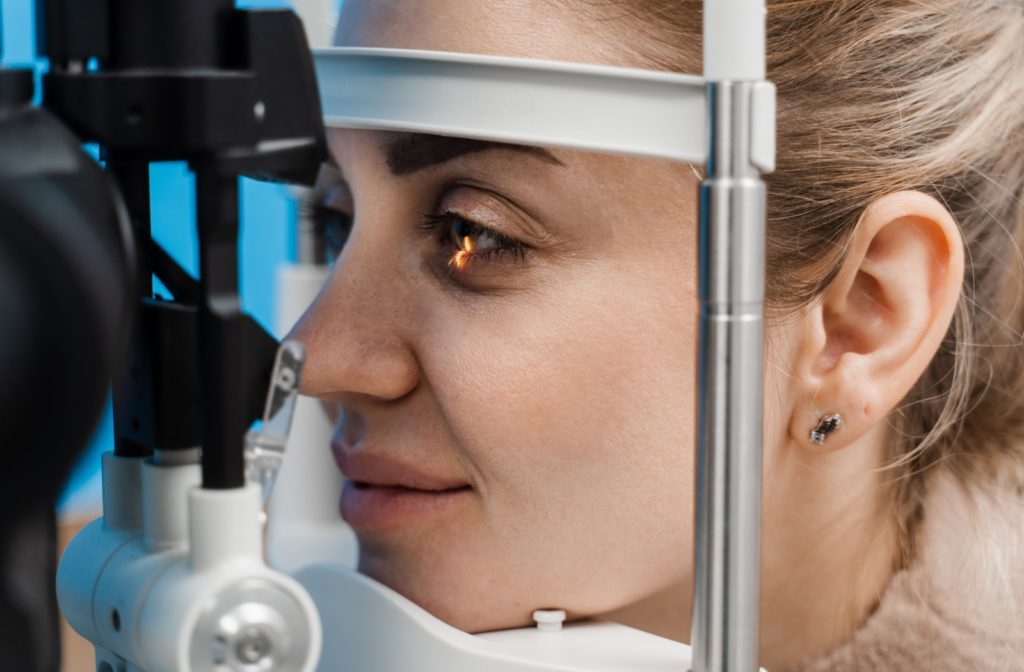Many people are concerned that not wearing their glasses could result in deteriorating eyesight, a worry particularly prevalent among those who rely on corrective lenses for daily activities.
To debunk the myth suggesting that skipping your glasses can weaken your eyesight, one must first understand how glasses affect eyesight, the reality of dependence on glasses, and the potential direct impacts of not wearing glasses.
At Dr. Henslick Vision Center, we offer tailored eye care to meet your specific needs, using the latest technology and a dedication to eye health. Our team can get you comfortable wearing your glasses and seeing clearly with corrected vision.
Understanding How Glasses Affect Your Eyesight
Glasses play a key role in correcting common vision problems like myopia, hyperopia, and astigmatism, which stem from the eye’s shape affecting light focus. They are precisely designed to adjust light’s path, enhancing vision clarity and accuracy. Prescribed by professionals, glasses make sure that vision correction is tailored to individual needs, enabling wearers to experience the world with enhanced detail.
Choosing not to wear glasses can lead to temporary discomfort or eye strain due to the effort to focus without correction, but this does not cause any further damage to eyesight. Symptoms like blurred vision and headaches reflect the lack of corrective support but do not indicate a worsening of vision. Once glasses are worn again, these symptoms usually subside as the eyes no longer strain to focus.
Glasses are a great tool for those with refractive errors, improving vision clarity by meeting each person’s specific needs. While skipping them temporarily may cause discomfort, it doesn’t permanently affect vision. For optimal eye health and comfort, it is recommended to adhere to the prescribed use of glasses.
Why Do People Need Glasses?
People wear glasses for two primary reasons–myopia and hyperopia, which affects the ability to see objects up close. Hyperopia frequently develops with age, particularly noticeable in the 40s and 50s when reading in dim light becomes challenging. This condition arises as the lens loses its flexibility, making it difficult to focus on nearby objects.
Glasses correct these vision issues by bending light rays to properly focus on the retina, allowing clearer vision at various distances.
The Reality of Dependence on Glasses
Despite the belief that glasses can worsen vision, there is no evidence supporting this claim. The misconception may stem from adults’ increased dependency on glasses due to the natural aging process of the eye’s lenses, not from the glasses themselves. This reliance is often mistaken for a detrimental effect of glasses, although they cause no harm to eyesight and not wearing them when needed may lead to eye strain or discomfort.
For children, however, the necessity and prescription of glasses play a crucial role in their visual development.
Potential Indirect Impacts of Not Wearing Glasses
There are scenarios in which not wearing glasses could indirectly affect your vision:
- Eye Strain: Not using corrective lenses when required can lead to temporary discomfort, headaches, or fatigue. Continuous strain might worsen existing eye conditions or lead to symptoms such as dry eyes.
- Squinting: Trying to see clearly without glasses often results in squinting. Squinting may temporarily improve your vision but can also cause eye muscle strain over time.
- Reduced Visual Acuity: While neglecting to use glasses doesn’t directly worsen your vision, it may lead to a perceived decline in visual acuity due to the absence of necessary correction.
The Importance of Wearing Prescribed Glasses
Wearing glasses as prescribed is important to ensuring visual comfort, clarity, and safety. Skipping them won’t permanently harm your eyes, but it can lead to temporary issues like discomfort and strain. If you notice any changes in your vision or experience discomfort with your current glasses, it’s essential to consult an optometrist or ophthalmologist. They can perform an eye exam and adjust your prescription or suggest alternative solutions to meet your visual needs, such as contact lenses or LASIK eye surgery.

The Bottom Line on Wearing Glasses
While wearing glasses doesn’t degrade your eyesight, it’s critical to use them as recommended to maintain optimal corrected vision. Regular eye exams, proper eye care practices, and addressing vision concerns promptly are key components of good eye health.
Occasionally skipping your glasses won’t cause your vision to deteriorate, but prioritizing your eye health will make it so you enjoy clarity and comfort in the long run.
Take the step towards the enhanced vision by scheduling your comprehensive eye exam today. Experience the benefits of professional, personalized care that only we can provide. Book your appointment now through our website or by giving us a call. With Dr. Henslick Vision Center, see the world in greater clarity.




